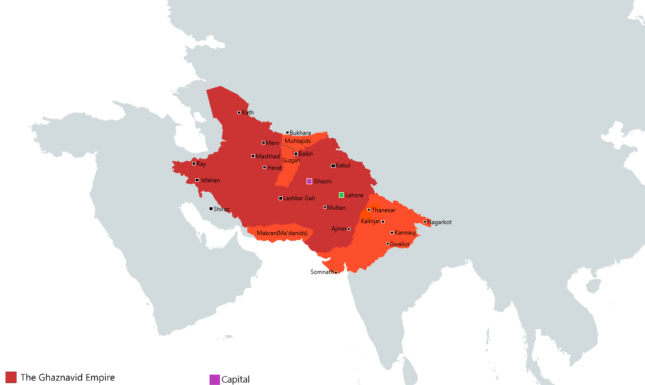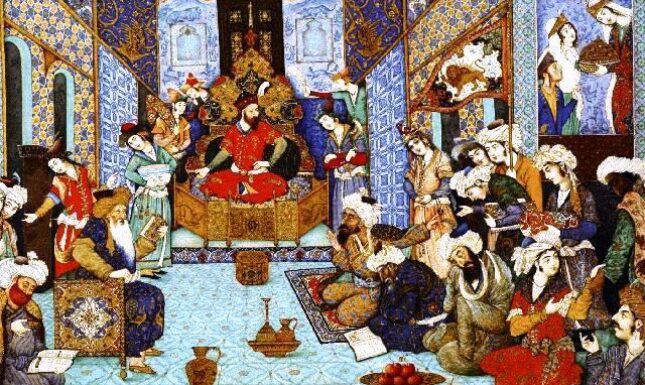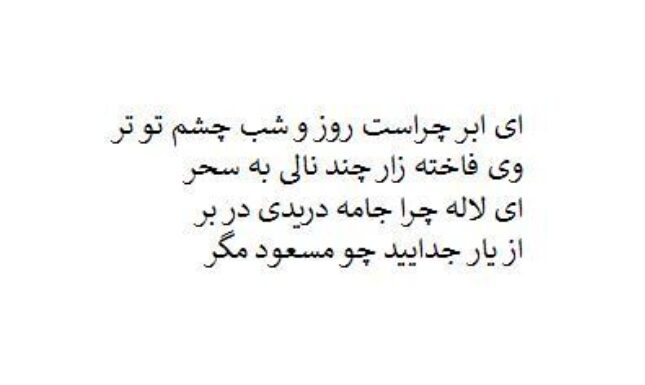Self-Thematicity in Masʿūd Saʿd Salmān’s Prison Poetry
This blog discusses the theme of isolation in the works of a medieval Persian poet.
Living in lockdown during the corona pandemic has foregrounded themes such as isolation, belonging, subjectivity, and creativity in seclusion. I was often reminded of Persian poets who were imprisoned for many years and composed poetry about their own mental and physical conditions. Such a lockdown is certainly not to be compared to a (medieval) cell, yet the urge to create works of art in isolation, the absence of a physical audience, curbing the sense of physical belonging, and placing oneself at its centre may be similar.
This blog deals with the theme of isolation and how it becomes an engine for creativity to transcend mundane norms and values. The Persian poet Masʿūd Saʿd Salmān (ca.1046-1122) spent some 17 years in prison. He wrote poetry for various courtiers, introducing new genres to the Persian literary tradition. [1] He is chiefly associated with the genre of ‘prison poetry’ (ḥabsiyyāt), which he perfected by exposing his psychological states, depicting the physical environment of the prison, and conveying his suffering with wardens and courtiers. He observed the courtly conventions of the time, competing with other poets and even outdoing talented poets to keep his name in the literary canon of his day. Born in Lahore, a literary centre for Persian poets, he composed some 16,000 couplets in various poetic forms. He was imprisoned for ten years (1089-99) during the reign of Ibrāhīm Sultan (1089-99) and later, during Sultan Masʿūd’s reign, for a further seven years (1100-7).

Writing poetry during his incarceration offered him the chance to represent multiple aspects of his personality. Unlike other poets of the period, whose aims were to record the patron’s exploits, functioning as modern “public relations” agents, Masʿūd Saʿd connects his own isolation with his praise of patrons. Masʿūd Saʿd does memorialise his patrons’ names but he does much more, because of his isolation. Instead of merely recounting the patrons’ exploits, isolation forced him to open a dialogue with courtiers, including the Sultan, even courageously criticising him for the sufferings he inflicted on him. Isolation also invited the poet to self-reflect and meditate on how his career had taken him from the top to the bottom of society’s hierarchies. Nostalgia for his previous life generated a rich cluster of motifs connected to the theme of exile. He characterised his poetry as his boon companion, finding solace in his own poetry. It is his talent burgeoning in isolation that allows him to write poems about new subjects, never before treated in Persian poetry. For instance, his prison comes to life as an ensouled being, oppressing him and reminding him of his past life. It is this feeling of isolation that has made Masʿūd Saʿd’s poetry a living tradition for thousands of Persian speakers who experience isolation.

It is impossible to analyse any of his poems in depth in this short piece, but I would just like to refer to a number of his quatrains, considering what it means when the poet’s audience is absent and the poet positions himself as the audience. I suggest that the absence of a physical audience created the genre of “prison poetry,” as the poet writes about his own conditions even in prison poems in which he praises his patrons. It is also essential to say here that while his longer panegyrics were dedicated to courtly princes, his quatrains were just occasional poems. We do not have any information on why they were written.
The following quatrain refers to the audience while also complaining of the heavenly sphere of fate, indicated by “the Wheel,” which has brought misery and anguish upon him:
در شعر مرا نیک و بد چرخ یکی است
گو خواه بگرد بر من و خواه بایست
هر شاعر نیک را قوی طایفه ایست
والله که مرا به طایفه حاجت نیست
dar shiʿr ma-rā nīk-u bad-i charkh yikīst
gū khvāh bigard bar man-u khvāh biīst
har shāʿir-i nīk rā qavī ṭāyifaīst
va-llāh marā ba ṭāyifa ḥājat nīst [2]
For me, in poetry, the good and bad that the heavenly Wheel brings are the same;
Say to it, “Either revolve around me or stand still!”
Every good poet possesses a strong tribe,
By God, I have no need of a tribe.
Here isolation goes with despair. It is as if he does not care whether his situation is becoming worse. The poet has become indifferent to anything the Wheel of Fortune may bring. Is the poet’s allusion to the Wheel a sign of his surrender to his fate? While this may be the case, the last couplet is most interesting. Here he refers to the audience for whom a poet writes. The task of a courtly poet was to depict the patron’s traits and exploits, but here the poet appears to be missing his audience. The word ṭāyifa means “tribe,” “community,” “people,” “family.” While the word certainly refers to all these, it may also be read as the poet’s audience. In the last line he swears that he does not depend on any audience. While frustration can be detected from this quatrain, isolation has forced the poet to admit to the situation. Here, and in several of Masʿūd Saʿd’s poems, he centres himself as the audience, to share his self-referential experiences in terms both of his psychological conditions and his physical deterioration. His collected poetry is brimming with complaints about his incarceration, also with allusions to his physical wellbeing. One should, of course, be careful when interpreting such poems as referring purely to the poet himself because they are not autobiographical reports, yet they ring true of medieval prison conditions:
دوشم همه شب چنگ چو شمشیر بخست
آرام مرا چو ناخن شیر بخست
تن را پس و پیش و زبر و زیر بخست
تا این تن خایه و سرکیر بخست
All last night, claws pricked me like a sword
Without movement, they pierced me like a lion’s claws.
They wounded the body back and forth and top to toe,
Until this body scratched my balls and the head of my penis. [3]
While the date and place and purpose of this poem remain unclear, its self-referentiality is quite evident. At one level, this is a poem about sexual frustration, suggesting masturbation. At another level, the poet depicts how his entire body burns and how claws (i.e. nails) are scratching his whole body the entire night to the extent that he is wounded. The word khastan means among others “to wound,” “to pierce,” and “to prick.” If we exclude sexual frustration, would this allude to the prison’s lack of hygiene, or suffering from some illness? One can easily imagine the horrifying conditions of medieval prisons, but here the poet relies on his talent and, despite his mental and physical suffering, composes poetry, limning his frustrations and agonies in a highly aesthetic form. It is due to this aestheticism that his poetry has survived the test of time and, 900 years later, we are able to read about and contemplate the poet’s condition.
Artur Sandauer (1913-1989) proposed the term self-referentiality in the study of modern fiction. The term alludes to the poet creating his own subject-matter; the poetry focuses on itself and its meanings are solely derived from its themes. Sandauer uses another term that is useful for analysing Masʿūd Saʿd’s poetry, and this is self-thematicity. He defines it as follows:
"I aim to describe the adventure of one who is tempted, having rejected all events thrust upon him by the external world and the imagination, to create poetry not about what is seen or thought, but about the very concept of seeing and thinking, a pure drama, destitute of all of the incidental content of consciousness." [4]
This definition applies to modern European poetry, but there are elements that suit Masʿūd Saʿd’s situation and poetry. Having been rejected by the court, isolated and limited in his freedom, Masʿūd Saʿd does not compose poetry like other contemporary Persian court poets, he writes about his own situation and condition, about what he sees in his cell, what he thinks and what he feels. The quatrains cited above could be regarded as examples of self-thematicity in which the poet looks at his cell and writes about his own thoughts and feelings. This self-thematicity also appears in his love poetry, as in the following quatrain:

O cloud! Why are your eyes wet day and night?
O emaciated ring-dove! Why are you groaning at dawn?
O tulip! Why do you tear apart your dress?
Are you separated from your beloved, like Masʿūd? [5]
Given Masʿūd Saʿd’s imprisonment, the poem is not just a love poem, but a statement of homesickness, of missing his loved ones. The fact that he names himself in the last line compels the reader to think of the poet himself. Such poems could easily be appropriated by the audience, to reuse in other contexts, but by mentioning his name he disallows appropriation. Such strategies require systematic study to gauge how the poet places himself at the centre of attention in these types of quatrains. Is this a strategy to beg attention for his situation? It is worth mentioning here that in poems such as his panegyrics, Masʿūd Saʿd connects themes related to his own condition to praise for his patron. While he tries to trigger a feeling of compassion in his patron, he also showers praises upon him, hoping for freedom. Despite the strictly conventional literary tradition, we see in Masʿūd Saʿd’s poetry how he uses his isolation to create a new poetic genre.

Notes
[1] For a monograph on the poet see S. Sharma, Persian Poetry at the Indian Frontier: Masʿūd Saʿd Salmān of Lahore, Delhi: Permanent Black, 2000.
[2] Masʿūd Saʿd Salmān,, Dīvān, ed. R. Yāsamī, Tehran: Amīr Kabīr, 1362/1983, p. 690.
[3] Dīvān, ed. R. Yāsamī, p. 685.
[4] See http://fp.amu.edu.pl/literatures-perpetuum-mobile-or-a-few-words-on-self-referentiality/ (last accessed 25 May 2021).
[5] Dīvān, ed. R. Yāsamī, p. 700.
© Asghar Seyed Gohrab and Leiden Medievalists Blog, 2021. Unauthorised use and/or duplication of this material without express and written permission from this site’s author and/or owner is strictly prohibited. Excerpts and links may be used, provided that full and clear credit is given to Asghar Seyed Gohrab and Leiden Medievalists Blog with appropriate and specific direction to the original content.


